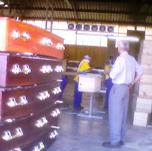Untimely death of our colleague, Tony Poulter
April 20 2007:
All of us at ARC would like to announce our deep sadness at the death of Tony Poulter, 49.
He had been one of the guiding forces and quiet strengths behind the Eco-Coffins project in South Africa, which ARC has been supporting since 2005. He died on March 23 at home, suddenly, of a heart attack.
He was therefore one of the first people to make use of an eco-coffin: an irony that he would have appreciated.
“We have lost a friend, an innovator, a compassionate leader, and a person who made things happen,” said Dr Guy Preston, head of the Working for Water programme in South Africa, who had been working with Tony for many years.
“When vying for the Development Marketplace grant for developing Eco coffins, there was never any doubt in my mind that the best person to get this off the ground was Tony Poulter. The confidence was well founded.”
 |
 |
 |
Tony checking the output of eco-coffins from the facility in KZN. This was the last photograph taken of him. |
“Some wag once said, ‘When all is said and done, more is said than done.’ With Tony, it was the opposite,” Dr Preston added.
“The foundation for the Eco-coffin project is strong. How sadly ironic that he should be among the first to use one. I shall miss him, and all he contributed to the well-being of people and the environment in our country through the many initiatives he managed. It is a loss we can ill-afford.”
"We were fortunate to have worked with Tony, even though it was for far too short a time," said ARC's communications director Victoria Finlay. "He was the kind of person who, when you met him, you knew that the project would be in safe hands. He was a man to respect."
The Eco-coffins project, where invasive alien wood is used to make high-quality coffins at affordable prices for the poor, was just one of the far-reaching projects that Tony helped to turn into a reality. He also oversaw a project to eradicate the house crow (a bird invader that has had devastating impacts upon indigenous bird species, poultry, and the spread of disease) as well as building a state-of-the-art biological control facility to research the safe release of natural enemies of highly invasive alien plants – perhaps the only long-term option for the country and continent against such harmful invaders.
Tony was an adventurer, and a leader, who set up and led “high altitude” teams that tackled difficult-to-reach tree invasions, before they get out of control.
“Not only was he outstanding in getting projects off the ground, but he excelled in mentoring up young talent to manage these projects,” said head of the KwaZulu-Natal Department of Agriculture and Environmental Affairs and Co-Chair of the Invasive Alien Species Programme (IASP), Dr Jabulani Mjwara.
“But perhaps more than anything else, it was for his commitment to secure employment and training opportunities for thousands of marginalized people in our Province and country, that many will bless the memory of Tony Poulter.”
Popularly known as “Mafikizolo”, Tony was born on August 18, 1957 in Roodepoort, Johannesburg. He worked at Bergvliet State Forest before enrolling at Saasveld Forestry College in 1979, where he obtained his Diploma in Forestry. Between 1981 and 1990, he worked for the South African Forestry Research Institute as a researcher. His later research was important evidence that led to the establishment of the Government’s Working for Water programme to control invasive alien plants. He was employed as a director and regional project leader by Working for Water until 2005 when he left to co-manage the IASP with Ms Nonhlanhla Mkhize.
He was cremated in an eco-coffin casket. “I think he would have wanted a [simpler] rope-handle coffin … but one can understand the emotion of his co-workers,” Dr Preston said.
Tony is survived by his mother Mrs Eve Gibbon, his sister Mrs Desiree Hainsworth and his brother Mr Dave Poulter.
|

